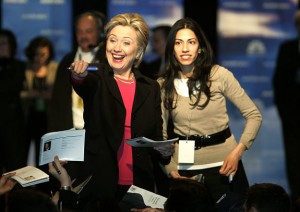Editor’s Note – It amazes us at SUA that people across the land still consider Hillary Rodham Clinton as a viable Presidential candidate anymore. The reasons must follow that too many people are still ill-informed, have willingly suspended disbelief, have a cognitive estrangement with the truth, and/or are so deeply ideological, even her failures do not count.
In fact, even she cannot cite any successes for which she is responsible in her years as Secretary of State or as a Senator from New York. When the New York Times points these issues out, it surely is time for America to take notice, peel the scales from their eyes, and come back to reality.
Today’s abysmal results of her foreign policy efforts on behalf of her boss, Barrack Obama, are telling to say the least. When we look at the current state of Ukraine, Iran, Israel/Palestine, Syria, Egypt, North Korea, China, Myanmar, Venezuela, Cuba, and many more corners of the Earth; each display daily a cause of major concern. It is not a good time to be an ally of the United States – we are no longer to be trusted; we are less than a paper tiger.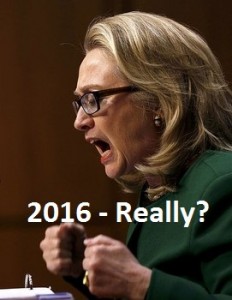
Failure is the only consistent thing in her resume, going all the way back to the Whitewater scandal when her husband was Attorney General and then Governor of Arkansas and into his first campaign for the Presidency, then through the Travel Office Scandal when he took office, to Benghazi and beyond. Let’s not forget her allegiance and sympathy for the Muslim Brotherhood through her assistant Huma Abedin and the Clinton Global Initiative that is supported by these types.
“At this point, what difference does it make?”
Remember, she was the one who chose Christopher Stevens as Ambassador to Libya and watched idly as he and three others died horribly, as well as leaving over 30 other people at risk that day. We must point out one nefarious fact, her only success there was the jailing of a man who made a silly video.
We can cite one major accomplishment, she ranks at the top of the most traveled Secretaries of State ever – all with no positive result. If numbers of countries visited, miles traveled, or fuel burned, were what counted, at least those she is compared against at those levels had a major impact in keeping America’s reputation and influence at a continued high level, most unlike our standing today.
Hillary Clinton Struggles to Define a Legacy in Progress
By MARK LANDLER and AMY CHOZICK – New York Times
WASHINGTON — It was a simple question to someone accustomed to much tougher ones: What was her proudest achievement as secretary of state? But for a moment, Hillary Rodham Clinton, appearing recently before a friendly audience at a women’s forum in Manhattan, seemed flustered.
Mrs. Clinton played an energetic role in virtually every foreign policy issue of President Obama’s first term, advocating generally hawkish views internally while using her celebrity to try to restore America’s global standing after the hit it took during the George W. Bush administration.
But her halting answer suggests a problem that Mrs. Clinton could confront as she recounts her record in Mr. Obama’s cabinet before a possible run for president in 2016: Much of what she labored over so conscientiously is either unfinished business or has gone awry in his second term.
From Russia’s aggression in Ukraine and the grinding civil war in Syria to the latest impasse in the Middle East peace process, the turbulent world has frustrated Mr. Obama, and is now defying Mrs. Clinton’s attempts to articulate a tangible diplomatic legacy.
“I really see my role as secretary, and, in fact, leadership in general in a democracy, as a relay race,” Mrs. Clinton finally said at the Women in the World meeting, promising to offer specific examples in a memoir she is writing that is scheduled to be released in June. “I mean, you run the best race you can run, you hand off the baton.”
The relay metaphor has become a recurring theme for Mrs. Clinton during this year of speculation about her future. She did her part, it suggests, but the outcome was out of her hands. And so Mrs. Clinton is striking a delicate balance when discussing a job that would be a critical credential in a presidential race.
On the one hand, she wants credit for the parts of Mr. Obama’s foreign policy that have worked, like the pressure campaign against Iran over its nuclear program, which she helped orchestrate and which has pulled Iran to the bargaining table.
On the other, she is subtly distancing herself from the things that have not worked out, like Mr. Obama’s “reset” of relations with Russia. She recently likened President Vladimir V. Putin’s annexation of Crimea to actions by Hitler in the 1930s, and posted on Twitter a photograph of herself with members of Pussy Riot, the protest group that is Mr. Putin’s nemesis.
Mrs. Clinton’s Republican opponents, losing no time in trying to define her, note that she gave Russia’s foreign minister the infamous mistranslated red plastic button to reset relations. It said “overcharge,” not “reset.” They have been tireless in raising questions about the deadly attack on the American diplomatic mission in Benghazi, Libya.
While Republicans are likely to make her part of a broad critique of the Obama administration’s approach to national security, Mrs. Clinton’s hawkish views could also be a problem in ensuring the support of liberals in her own party, who are weary of foreign entanglements.
In one sense, though, the cascade of foreign crises that now bedevil Mr. Obama could play to Mrs. Clinton’s advantage. By presenting herself in her book and in any possible campaign as the toughest voice in the room during the great debates over war and peace, she could set herself apart from a president who critics charge has forsworn America’s leadership role in the world.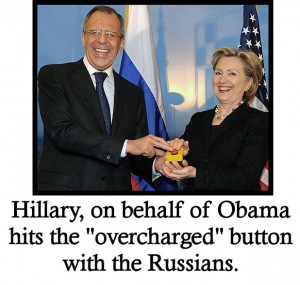
Mrs. Clinton has scrupulously avoided publicly criticizing Mr. Obama; White House aides said he still called her for advice. And much of the administration’s foreign policy still bears her imprint, like the Iran sanctions and a more confrontational stance toward China, which she pioneered and Mr. Obama has embraced.
But in recent interviews, two dozen current and former administration officials, foreign diplomats, friends and outside analysts described Mrs. Clinton as almost always the advocate of the most aggressive actions considered by Mr. Obama’s national security team — and not just in well-documented cases, like the debate over how many additional American troops to send to Afghanistan or the NATO airstrikes in Libya.
Mrs. Clinton’s advocates — a swelling number in Washington, where people are already looking to the next administration — are quick to cite other cases in which she took more hawkish positions than the White House: arguing for funneling weapons to Syrian rebels and for leaving more troops behind in postwar Iraq, and criticizing the results of a 2011 parliamentary election in Russia.
The criticism of the Russian election led Mr. Putin to accuse her of fomenting unrest, and left some senior Obama aides unhappy. “Some at the White House thought she overstepped,” said Michael A. McFaul, a former ambassador to Russia, who supported her view.
At the same time, Mrs. Clinton’s instincts were curbed by her innate caution, her determination to show loyalty to a rival-turned-boss and her growing pains in the job. Still, dissecting her record yields tantalizing clues about what kind of foreign policy she might pursue as president. “Hillary unbound,” people who worked with her say, would be instinctively less reluctant than Mr. Obama to commit the military to foreign conflicts.
“It’s not that she’s quick to use force, but her basic instincts are governed more by the uses of hard power,” said Dennis B. Ross, a former White House aide who played a behind-the-scenes role in opening secret direct talks with Iran about its nuclear program.
Leon E. Panetta, who forged close ties to Mrs. Clinton as defense secretary and C.I.A. director, said she was a stalwart supporter of the C.I.A.’s activities in Pakistan — read, drone strikes — and an influential voice in advising Mr. Obama to order the raid that killed Osama bin Laden.
“The president has made some tough decisions,” Mr. Panetta said. “But it’s been a mixed record, and the concern is, the president defining what America’s role in the world is in the 21st century hasn’t happened.”
“Hopefully, he’ll do it,” Mr. Panetta said, “and certainly, she would.”
The Mideast Peace Process
Mrs. Clinton’s hawkish inclinations were well established in her bitter 2008 Democratic primary campaign against Mr. Obama, when she famously criticized as naïve his willingness to talk to America’s adversaries without preconditions. But when he persuaded her to join his “team of rivals,” she submerged her views and worked hard to establish her loyalty — all of which has added to her problems in promoting her record.
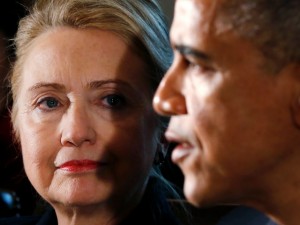 A case in point is the Middle East peace process, in which secretaries of state from Henry A. Kissinger to John Kerry have tried to make their mark. “There’s core-course curriculum, and then there’s extra credit,” said Denis R. McDonough, the White House chief of staff. “This is always seen as a core requirement for a secretary of state.”
A case in point is the Middle East peace process, in which secretaries of state from Henry A. Kissinger to John Kerry have tried to make their mark. “There’s core-course curriculum, and then there’s extra credit,” said Denis R. McDonough, the White House chief of staff. “This is always seen as a core requirement for a secretary of state.”
Mrs. Clinton’s marching orders from the White House were to demand that Israel cease the building of Jewish settlements in the West Bank as a way to lure the Palestinians into talks, and she did so with a fervor that surprised Mr. Obama’s advisers. But they had conceived the strategy, and Mrs. Clinton privately had qualms with it, which proved well founded.
“We did not make it sufficiently clear that this was not a precondition but part of an effort to create an overall atmosphere in which negotiations could succeed,” said George J. Mitchell, the former Middle East envoy who left in 2011 after failing to break the logjam.
Mr. Kerry has tried a different approach to peacemaking, with little to show for it so far. But he seems determined to keep trying, while some veterans of Middle East diplomacy say Mrs. Clinton gave up too easily. In a recent interview with Time magazine, former President Jimmy Carter said that “she took very little action to bring about peace.”
Today, when Mrs. Clinton’s aides talk about the Middle East, they barely mention the Israeli-Palestinian talks, preferring to discuss the cease-fire she brokered in November 2012 between Israel and Hamas in Gaza, where she twisted arms to avoid escalating violence.
Building Pressure on Iran
Mrs. Clinton was more successful in dealing with Iran. As with the Middle East, she was skeptical that Mr. Obama’s initial strategy — reaching out to Iran’s leaders — would work. So when he shifted to sanctions, she was eager to build pressure on what she called a “military dictatorship.”
It was a tough job against long odds, said Tom Donilon, the former national security adviser, because it meant pressing allies in Europe and Asia, huge trading partners of Iran, to agree to steps “that had a real cost.”
Mrs. Clinton delivered her stern message with a smile. In June 2010, the day before the United Nations voted on strict new sanctions against Iran, Mrs. Clinton invited China’s ambassador to Washington, Zhang Yesui, to a hotel bar in Lima, Peru, where both were at a conference.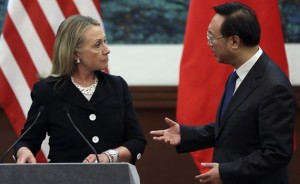
Drinking pisco sours, the potent local cocktail, Mrs. Clinton and Mr. Zhang went over an annex to the Security Council resolution line by line as she tried to clinch Beijing’s agreement to withdraw investments in Iran by Chinese banks and state-owned enterprises.
The sanctions, Mrs. Clinton likes to remind audiences, crippled Iran’s oil exports and currency, setting the stage for the election of Hassan Rouhani, a relative moderate, as president and for Iran’s renewed interest in diplomacy.
Mr. Obama had first proposed direct talks in a letter to Iran’s supreme leader, Ayatollah Ali Khamenei, in 2009. Mrs. Clinton authorized Mr. Ross, then her special adviser, to explore a back channel to the Iranians through the Arab sultanate of Oman.
In January 2011, Mrs. Clinton stopped in Oman on a tour of the Persian Gulf that was notable because she gave a speech, on the eve of the Arab Spring, warning leaders that they risked “sinking in the sand” if they did not reform their societies. Less noticed was her meeting with the sultan, in which he offered to facilitate a meeting with the Iranians.
After some exploratory meetings with a delegation from Tehran, Mrs. Clinton sent two of her top lieutenants, William J. Burns and Jake Sullivan, to Oman for more intensive negotiations. That opened the door to the nuclear talks now underway in Vienna. But what her colleagues remember most is her steadfast conviction that Iran would deal only under duress.
“She was skeptical that it would produce anything, or at least anything quickly, and in a way she was right because it took several years to get to that point,” said Mr. Burns, a deputy secretary of state.
With China, too, Mrs. Clinton set the stage for a more confrontational approach, though that was not the policy she followed at the outset. When she made her first trip as secretary of state to Beijing, she stumbled by suggesting that the United States would not offer lectures on human rights as much as it had in the past.
By 2010, however, she sounded more like the woman who had cut her teeth on the global stage in 1995 with a defiant speech on women’s rights at a United Nations conference in Beijing. Attending a summit meeting in Vietnam, she thrust the United States into a tangled dispute between China and its neighbors over the South China Sea.
The Chinese government was enraged by her meddling, but her actions set a new context for the relationship. By insisting that China adhere to international norms and by shoring up American alliances with Japan, South Korea and the Philippines, Mrs. Clinton moved Washington away from the China-centric model favored by previous presidents.
“Secretary Clinton strongly pushed for a 21st-century conversation with China and resisted occasional Chinese efforts to engage in a secretive, 19th-century diplomacy,” said Kurt M. Campbell, a former assistant secretary of state for East Asian affairs.
When the State Department proposed sending 2,500 Marines to Australia to underline America’s commitment to Southeast Asia, the Pentagon, Mr. Panetta said, latched on to the idea, because “it fit the new defense strategy we were developing.”
Mrs. Clinton became the most visible and energetic exponent of the president’s “Asia rebalance” — so much so, in fact, that her aides complained to Mr. Donilon at one point that she was not getting enough credit for it. In a lingering sign of Mrs. Clinton’s influence, Mr. Obama will visit the Philippines, Malaysia, Japan and South Korea next week.
Kim Beazley, Australia’s ambassador to Washington, credits her with reversing a laissez-faire approach to the Pacific Rim that dated from the Nixon administration. “She was metronome perfect,” he said.
A Different Standard
As Mrs. Clinton’s aides shape her legacy, one of their biggest frustrations has been explaining that the most publicized work of her tenure — her emphasis on the rights of women and girls — was not a safe or soft issue, but part of a broader strategy that strengthens national security. Mrs. Clinton may be the only diplomat, they say, who is criticized for being simultaneously too dovish and too hawkish.
“You can’t have it both ways,” said Thomas R. Nides, a former deputy secretary of state who is now a vice chairman at Morgan Stanley. “You can’t say that she’s about soft power, women and girls, and hospitals and ribbon cuttings, and simultaneously maintain that all she cares about is drones, missiles, going to war.”
Because of her celebrity and her potential political future, Mrs. Clinton’s advocates say, she is held to a different standard than other secretaries of state. More than ever, they say, the job is defined not by clear victories but by a dogged commitment to the process.
“We have sort of a heroic vision of diplomacy,” said James B. Steinberg, who served as deputy secretary of state. “But it’s really easy to overwrite the traditional role of leader-to-leader diplomacy.”
Anne-Marie Slaughter, a former director of policy planning at the State Department, said, “I think of her as being extraordinarily resourceful within a set of constraints.” She noted, for example, that Mrs. Clinton had to spend three months apologizing for the undiplomatic remarks in the secret cables disclosed by WikiLeaks.
Mrs. Clinton’s memoir will allow her to give her view of WikiLeaks, Benghazi and smaller missteps like the Russia reset button — a stunt she nevertheless liked enough that she later gave one to Mr. McDonough to smooth over friction with the White House over personnel issues.
Mrs. Clinton’s vision of 21st-century diplomacy mirrors what her allies say is a vision of a more engaged America. The question is whether that vision will be appealing to a nation that, after 12 years of war, is weary of foreign adventures. Liberal critics may have no other choice for a candidate.
“Although there will be a good number of folks in the Democratic Party who are uncomfortable with her hawkishness, they will ask themselves, ‘Where else can we go?’ ” said Paul R. Pillar, a former C.I.A. analyst who now teaches at Georgetown University and supports Mr. Obama’s more cautious view of the American role abroad.
Mr. McDonough, one of Mr. Obama’s closest foreign policy advisers, declares himself a great admirer of Mrs. Clinton. But he was on the other side of the internal debate over providing weapons to the Syrian rebels, and, like his boss, is cautious about the use of American force. However harrowing the conflict, he said, “you have to be disciplined about where you invest this country’s power.”
“We’re leaving an era where the country gave the president a lot of leeway, in terms of resources, in terms of time,” Mr. McDonough said. “It will be a long time before a president has the kind of leeway in this space that President Bush had.”

